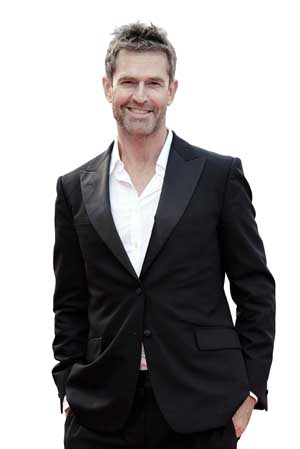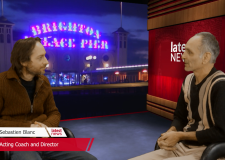Interview: Rupert Everett
Actor and Hollywood star Rupert Everett takes on the role of Oscar Wilde in David Hare’s The Judas Kiss. Andrew Kay talks to him about Oscar and the art of playing Wilde
The Judas Kiss must be the most exhausting performance, even though you are very static for much of the play. How much energy goes into being that still and controlled?
“I don’t know, quite, but it is very exhausting. I’m sitting in a chair for half the time, I don’t know why, even that is tiring.”

Was that the directors idea?
“We all had this idea that we wanted it to have a side to it, like Beckett (Samuel) and I figured that it would be great not to move at all in the second half. We all felt it worked with me being the still centre, a beached whale with everyone moving around me.”
How did you come to do the play?
“It was my idea. Originally I was asked to do it in French in Paris and thank god I didn’t because learning it in English was difficult enough. It was nearly beyond me because I’ve got one and a half brain cells left. But it wasn’t just me, we all found it very difficult to learn. It has to go at a real clip and one false move and you’re falling down the mountain side. So rather than do it in French I thought maybe I should do it in English. I am trying to get together my own film about Wilde and it’s very difficult to persuade people that you can do things these days, we don’t live in a frontier world anymore so unless people believe in you as a success they will not invest, you have to have done it before. I realised to get the finance together for the film I would have to prove that I could do it, people don’t see me as being Wilde.”
Is that because you are still perceived as being very young?
“Yeah, young and thin. So how am I going to be that elephantine lumbering thing.”
But surely the physicality is easy, you can stick a cushion up your jumper? But that would not give you that magnificence, that great presence.
“I thought that it was a part that I could play. Then my friend Robert Fox, our producer, talked about this, because the play was a disaster when it was first produced here, everything about it was wrong and misguided, but that was a great starting point as things could only go up, and it’s a great, great play.”
It’s a clever concept because it takes these two extraordinary moments in Wilde’s life.
“Everyone who knows Wilde has their own version of this, but David Hare’s is a really compelling one. And it is written like a Weldon pot-boiler a bit, it’s got a great conventional background to it; will he? Won’t he? Neil the director had done it very successfully in Australia and wanted to do something here, and then we got The Hampstead Theatre and that is how it all came together. Then we decided to tour and needed more money and now we are taking it into the West End to the Duke of York’s for a 12-week season.”
Do you like touring?
“I’ve never done it but I like the idea and I do like being on different stages. And we know it well enough now to do it on any stage, we are secure in the play. And it’s a total thrill to be taking it to Dublin. It will be amazing whether they hate it or love it.”
The reviews have been very strong?
“On the whole yes very strong – but you never know what will happen when the Irish factor comes in, the relationship between our two countries is so raw still.”
There’s no hint of you playing him as Irish?
“No, by the time he got to the age I am playing him he had no Irish accent. When he arrived at Oxford he had an Irish lilt and a lisp but it went within a matter of months. He then developed this amazing way of speaking with incredibly long and complicated sentences and that was how the natural him was. It was a mask.”
Hare has really got his head around that in the script, it is incredibly beautiful and poetic, it must be difficult.
“It’s difficult and it’s easy, David has written it with a great rhythm that really helps when learning a script. It’s rather like Wagner in the way it builds and then goes back then builds again. David has got that Wagnerian sense brilliantly.”
There’s a huge amount of sadness, especially in act II, a sense that he has really given up. How difficult was that to achieve when audiences are used to Wilde being this ebullient, charming, witty socialite?
“That is exactly why I want to make my film to show that his life in exile was a life in collapse, with a few bright bursts of wit. This play is a gift because you see him being very active and then see him being very passive.”
One of the great things about the production is the energy that Freddie Fox brings to the role of Bosie…
“He is fantastic at it and it is rare because, like playing Juliet, you have to be young to play it but too often you are too young to actually play it. What he does brilliantly is vertical take off, leaping into the speeches.”
It’s a very moving play. When you come off stage do you feel down or does the audience lift you?
“Not down at all, just getting through it can feel like a relief, it takes a lot of energy. I love getting through the first act, it’s so hard, after that I’m just enjoying it.”
Do you see Wilde as being an innocent, or naïve?
“The thing that is so attractive about him is the mixture of brilliance and buffoonery; he is an idiot as well as being a genius, a snob as well as being a libertine – everything is a contradiction.”
He must have known that what he was doing was going to get him into real trouble.
“God, who knows, he went to see a soothsayer know as the Sybil of Mortimer Street and her crystal ball crashed as they went in. Awful things were always happening, You know when you are a star you lose touch with reality.”
Did that happen to you as a star?
“I don’t know, not in the same way, not like straight stars. If you are a gay star someone’s always going to have a go at you so you have to keep your arse covered. But Wilde, he definitely felt he was above the law, he was living so dangerously by the end. When asked by the first lawyer if there was any truth in the rumours he said no. He then went home and said, ‘don’t worry, the working classes are with me to a boy’. Lunacy.”
You’ve played Wildean roles and now you are playing Wilde, is there a big difference?
“The reason I knew I could do this was in Glasgow at the Citizens I played Lord Henry Wotton in Dorian Gray. A great role and I knew at that point I could play Wilde.”





















